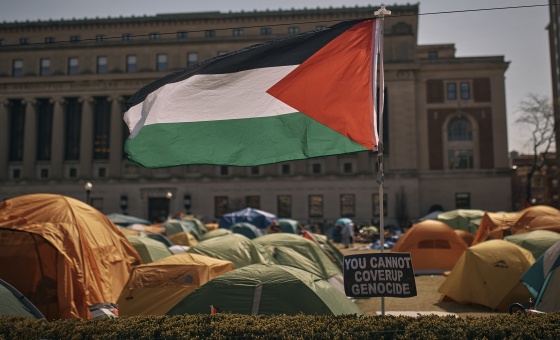This is the last article you can read this month
You can read more article this month
You can read more articles this month
Sorry your limit is up for this month
Reset on:
Please help support the Morning Star by subscribing here
ON January 16 the US government suspended Title III of the Helms-Burton legislation for 45 days. Title III is the part of the Helms-Burton Act which gives US citizens the right to sue foreign companies for using properties which were nationalised following the Cuban Revolution in 1959.
However, while the US strictly adheres to other articles of Helms-Burton (an Act which codified sanctions against Cuba into US law 23 years ago) Title III has never been enforced. Every president, Democrat and Republican, has waived this part of the Act on a six-monthly basis since it was passed in 1996.
In reducing the waiver period to just 45 days, the US government is sending a warning to the international community that anyone with investments in Cuba may be about to get dragged through the US courts.
Indeed, in the statement accompanying this news, the US government said it would use the 45 days to “to conduct a careful review of the right to bring action under Title III in light of the national interests of the United States and efforts to expedite a transition to democracy in Cuba.” It also cited Cuba’s “indefensible support” for Venezuela and Nicaragua as justification for the hardened stance.
In an open threat to foreign investors it concluded: “We encourage any person doing business in Cuba to reconsider whether they are trafficking in confiscated property and abetting this dictatorship.”
If Title III is enacted, it could see hundreds of thousands of legal claims against international companies and governments that have worked with Cuba over the last 60 years.
Cuban-American hardliners are relishing the chance to take the Cuban government to court — a grievance they have been carrying since many deserted their mansions, factories and plantations in the early years of the revolution.
Cuban Foreign Minister Bruno Rodriguez branded the decision “political blackmail” and a “brutal attack against international law.”
A Ministry of Foreign Affairs (Minrex) statement said: “Cuba strongly, firmly and categorically rejects such a threat, which is construed as an extremely arrogant and irresponsible hostile action, and repudiates the disrespectful and slanderous language used in the public announcement made by the State Department.”
Britain, like most other countries, negotiated compensation agreements over nationalised properties on the island many years ago. Cuba has repeatedly offered to do the same with the United States, but has been rebutted at every turn.
The US State Department’s action comes hot on the heels of a succession of increasingly hostile threats. National security adviser John Bolton, who has a history of aggression towards Cuba, recently labelled the island as forming a “troika of tyranny” together with Venezuela and Nicaragua.
If the waiver is removed and Cuban-Americans, and others, are allowed to make legal claims, there could be a tidal wave of cases, creating chaos by clogging up the US court system and fuelling international disputes with the US government over the policy.
The State Department anticipates that over 200,000 lawsuits could be filed, resulting in a nightmare scenario which could see the US claims industry going into overdrive. In the US’s famously litigious legal system, “No win, no fee” companies would be encouraged to pursue cases against any individual or organisation they perceived as susceptible to pressure.
However, analysts are predicting that such a move could backfire.
Cuba specialist Professor William Leogrande has warned that enacting Title III “would cause an enormous legal mess, anger US allies in Europe and Latin America, and probably result in a World Trade Organisation case against the US.”
Cuba Research Centre president Phil Peters foresees major international conflicts if Title III is waived: “US trading partners will rightly object to the extraterritorial application of US sanctions … The EU will surely revive its WTO action against Helms-Burton, which it suspended when the Clinton administration agreed to limit its implementation.”
No previous US president has risked unleashing such chaos in the US courts. But Trump is taking advice on his Cuba policy from Bolton, Senator Marco Rubio and hard-line anti-Cuba lobbyists in Florida who will go to any length to fulfil their historic mission to “reclaim Cuba” and deliver it back into the capitalist fold.
Even without Title III, the US blockade is already extraterritorial in its application. International companies including the Royal Bank of Scotland and Lloyds Bank have been fined billions of dollars by the US Office of Foreign Asset Control for historic trading with Cuba.
The Cooperative Bank closed the accounts of the Cuba Solidarity Campaign in 2016, and the Open University banned applications from Cuban students in 2017, both due to the perceived threat of fines for breaking US sanctions.
If Title III comes into effect it will ruin the chances of any future foreign investment in Cuba, and scare off those currently working there.
History has shown that the British government can not be relied upon to defend British companies’ rights to trade with the island. The government has never prosecuted a company for adhering to US above British sovereign laws, despite antidote legislation existing to enforce this.
The British government needs to make clear to the United States that attempts to impose blockade policies in Britain and on British companies will not be tolerated and are an affront to our own sovereignty and against our own interests.
Miami is home to Cuban-American descendants of the ruling elites who fleeced the people of Cuba under US protection for many years prior to the 1959 revolution. Since leaving the island they have dominated US Cuba policy for too long. Enforcing Title III is in the interests of no-one apart from this ideologically driven mob, motivated by rancour, bitterness and greed.
If enacted, Title III will kill off any possibility of improving US-Cuba relations and it will strangle any growth in British-Cuban trade. But its most devastating impact will be felt by the people of Cuba, already suffering under a 57-year-old blockade. We must do all we can to ensure this inhumane policy is not exacerbated by these new measures.
Rob Miller is director of the Cuba Solidarity Campaign.












